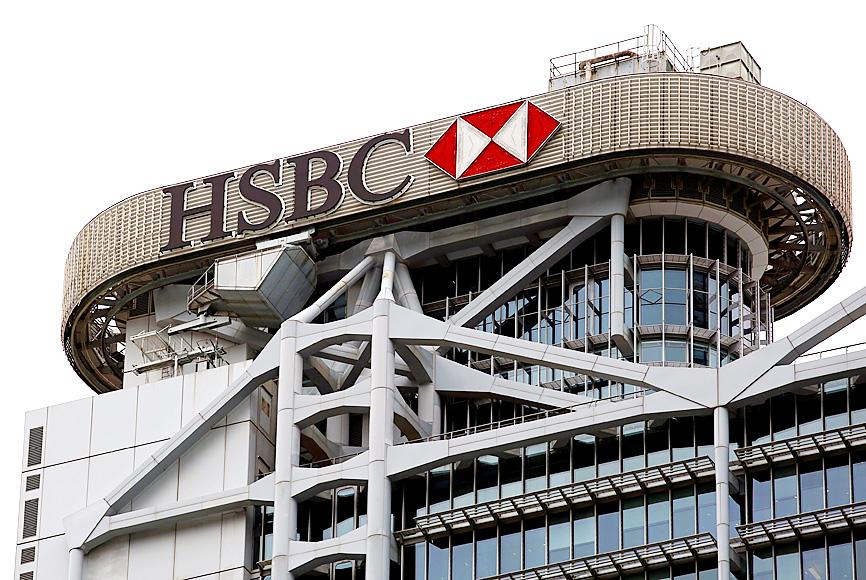HSBC Holdings PLC yesterday posted its best quarter since the COVID-19 pandemic began as an improving economic outlook drove optimism about the ability of borrowers to repay loans and its strategic reset to Asia remained on track.
First-quarter profit more than doubled as US$400 million of loan loss reserves were released, spurred by the rollout of vaccination programs in markets such as the UK.
Europe’s largest bank said that its increasing focus on servicing wealthy Asians had also got off to a strong start.

Photo: Reuters
Adjusted pretax profit of US$6.4 billion for the three months to the end of last month comfortably beat analysts’ forecasts.
The firm’s investment bank joined rivals in benefiting from active markets, as a 55 percent surge in equity trading helped lift the division’s revenue.
“The economic outlook has improved, although uncertainties remain,” HSBC chief executive officer Noel Quinn said in a statement. “We carry good momentum into the second quarter.”
Easing credit losses helped it turn around its UK business and it also posted a profit in the US even as it embarks on shifting billions of dollars to Asia.
Weighed down by low interest rates, HSBC is seeking out more fee-based income, targeting to become a leader in wealth management in an increasingly affluent Asia.
Asia continued to be its biggest profit center, but earnings there were relatively unchanged from a year earlier. It saw big jumps in profit at all of its major divisions.
With the virus restrictions easing in major markets, HSBC was boosted by the reversal in credit losses. This year, such losses are now seen below the medium-term range of 30 to 40 basis points of average loans it indicated at its latest annual results, the lender said.
However, Quinn said that the bank was watching closely developments in India, which has seen an upsurge in infections.
“We have to see how the pandemic develops in India, and we are watching very closely,” he said.
The bank said that it is continuing negotiations on a potential sale of its retail operations in France.
In the US, it is exploring “both organic and inorganic options for our retail banking franchise,” it said.
While attention has focused on the businesses it is attempting to sell, HSBC chief financial officer Ewen Stevenson said that the bank was looking at possible acquisitions, mainly focused on its Asian wealth business, which is at the heart of its strategic repositioning.
Asked about Citigroup Inc’s sales of parts of its Asian business, Stevenson said “very few of them” would be a good fit for HSBC.
“We are looking at other options in the region, predominantly in the wealth space,” Stevenson said in a Bloomberg Television interview.
HSBC has also spent the past year adapting its working practices as a result of the pandemic.
Quinn this month said that he would turn the entire executive floor of the bank’s London headquarters into meeting rooms and it eventually aims to cut its office space by about 40 percent.
It aims to cut its global office footprint by about 20 percent this year, HSBC said.

Nvidia Corp’s demand for advanced packaging from Taiwan Semiconductor Manufacturing Co (TSMC, 台積電) remains strong though the kind of technology it needs is changing, Nvidia CEO Jensen Huang (黃仁勳) said yesterday, after he was asked whether the company was cutting orders. Nvidia’s most advanced artificial intelligence (AI) chip, Blackwell, consists of multiple chips glued together using a complex chip-on-wafer-on-substrate (CoWoS) advanced packaging technology offered by TSMC, Nvidia’s main contract chipmaker. “As we move into Blackwell, we will use largely CoWoS-L. Of course, we’re still manufacturing Hopper, and Hopper will use CowoS-S. We will also transition the CoWoS-S capacity to CoWos-L,” Huang said

Nvidia Corp CEO Jensen Huang (黃仁勳) is expected to miss the inauguration of US president-elect Donald Trump on Monday, bucking a trend among high-profile US technology leaders. Huang is visiting East Asia this week, as he typically does around the time of the Lunar New Year, a person familiar with the situation said. He has never previously attended a US presidential inauguration, said the person, who asked not to be identified, because the plans have not been announced. That makes Nvidia an exception among the most valuable technology companies, most of which are sending cofounders or CEOs to the event. That includes

INDUSTRY LEADER: TSMC aims to continue outperforming the industry’s growth and makes 2025 another strong growth year, chairman and CEO C.C. Wei says Taiwan Semiconductor Manufacturing Co (TSMC, 台積電), a major chip supplier to Nvidia Corp and Apple Inc, yesterday said it aims to grow revenue by about 25 percent this year, driven by robust demand for artificial intelligence (AI) chips. That means TSMC would continue to outpace the foundry industry’s 10 percent annual growth this year based on the chipmaker’s estimate. The chipmaker expects revenue from AI-related chips to double this year, extending a three-fold increase last year. The growth would quicken over the next five years at a compound annual growth rate of 45 percent, fueled by strong demand for the high-performance computing

TARIFF TRADE-OFF: Machinery exports to China dropped after Beijing ended its tariff reductions in June, while potential new tariffs fueled ‘front-loaded’ orders to the US The nation’s machinery exports to the US amounted to US$7.19 billion last year, surpassing the US$6.86 billion to China to become the largest export destination for the local machinery industry, the Taiwan Association of Machinery Industry (TAMI, 台灣機械公會) said in a report on Jan. 10. It came as some manufacturers brought forward or “front-loaded” US-bound shipments as required by customers ahead of potential tariffs imposed by the new US administration, the association said. During his campaign, US president-elect Donald Trump threatened tariffs of as high as 60 percent on Chinese goods and 10 percent to 20 percent on imports from other countries.